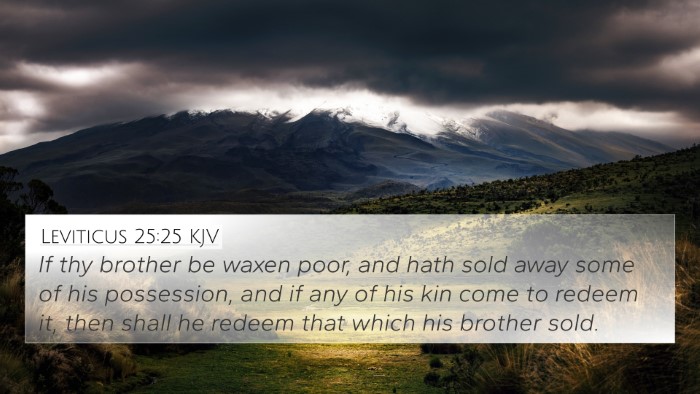Numbers 5:8 - Biblical Meaning and Insights
Verse: Numbers 5:8
The verse reads, "But if the man has no kin to whom restitution may be made for the guilt, the restitution for guilt that is made shall go to the Lord for the priest, in addition to the ram of atonement with which atonement is made for him."
Summary of the Verse's Meaning
Numbers 5:8 deals with the procedure outlined for making restitution in cases of wrongdoing. The verse highlights the importance of restitution in the context of sin and emphasizes a dual aspect of making amends: addressing the wronged party and fulfilling one's obligation to God through the priestly system.
Insights from Public Domain Commentaries
Matthew Henry on Numbers 5:8
Henry explains that the focus here is on the principle of restitution. If a person wrongs another but cannot repay them due to lack of kin, the restitution must instead be made to God through the priest. This reflects the understanding that one ultimately owes their allegiance and accountability to God.
Albert Barnes on Numbers 5:8
Barnes notes that this instruction maintains the sanctity of property and the necessity for individuals to seek reconciliation. The idea is that guilt requires compensation, and if a victim cannot be found, the result is a communal acknowledgment of wrongdoing that still requires corrective action directed towards God.
Adam Clarke on Numbers 5:8
Clarke highlights the priest's role in mediating between man and God, emphasizing that any restitution must also reflect a genuine desire for atonement. The passage resonates with the overarching theme of holiness and the expectation for individuals to uphold moral standards within the community.
Bible Verse Cross-References
To enhance the understanding of Numbers 5:8, here are some relevant Bible verse cross-references:
- Leviticus 6:5 - Discusses restitution to the wronged party.
- Exodus 22:3 - Outlines principles for restitution involving theft.
- Matthew 5:23-24 - Jesus emphasizes the importance of reconciliation with others before presenting gifts to God.
- Luke 19:8 - The story of Zacchaeus and his commitment to repay and restore what he unlawfully took.
- 1 John 1:9 - The necessity of confession and the assurance of forgiveness when one repents.
- Romans 13:7 - The need to fulfill obligations and the rendering of what is owed to authorities.
- James 5:16 - Confession and prayer among believers for healing and forgiveness.
Connections Between Bible Verses
Numbers 5:8 emphasizes a critical aspect of Bible verses that relate to each other. It draws a connection between ethical conduct within human relationships and a person's standing before God. The theme of restitution and atonement is echoed throughout Scripture, forming a consistent message about the importance of accountability and restoration.
Linking Bible Scriptures
The concept of restitution is particularly significant in both Old and New Testament teachings. For instance, Old Testament laws about restitution guide the behavior of individuals within the community, while New Testament principles advocate for heart transformation and true repentance.
Thematic Bible Verse Connections
Understanding the themes tied to Numbers 5:8 can significantly deepen one's appreciation for the biblical narrative surrounding sin and redemption:
- Accountability: How believers are called to hold each other accountable (Galatians 6:1).
- Atonement: Central to the priestly duties, connecting to the ultimate atonement found in Christ (Hebrews 9:12).
- Restoration: The journey towards mending broken relationships, seen in 2 Corinthians 5:18-19.
Tools for Bible Cross-Referencing
For those interested in exploring the cross-referencing Bible study in depth, consider using resources like a Bible concordance or a Bible cross-reference guide. These tools can help unveil the intricate connections between Bible verses, enriching your study experience.
Conclusion
Numbers 5:8 exemplifies the enduring principles of restitution and accountability before God. Its connections to broader biblical themes and teachings underscore the consistent message of maintaining relationships with both God and fellow human beings. As you study, look for comparative Bible verse analysis and seek verses that help highlight these connections, leading to a more profound understanding of Scripture.





